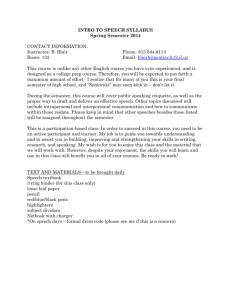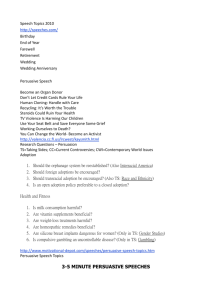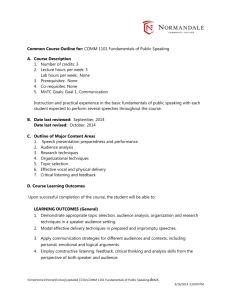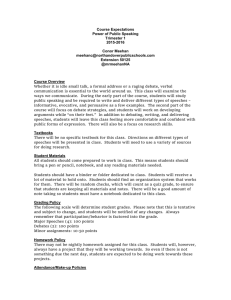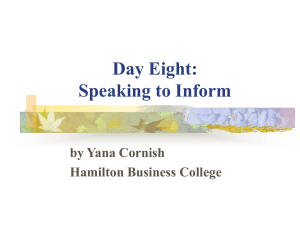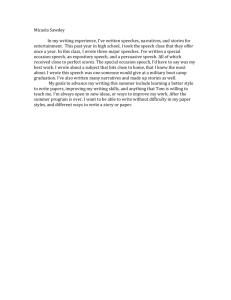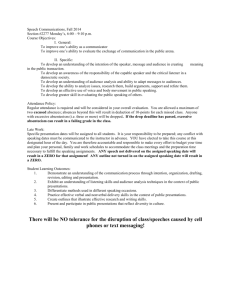Public Speaking 2015
advertisement
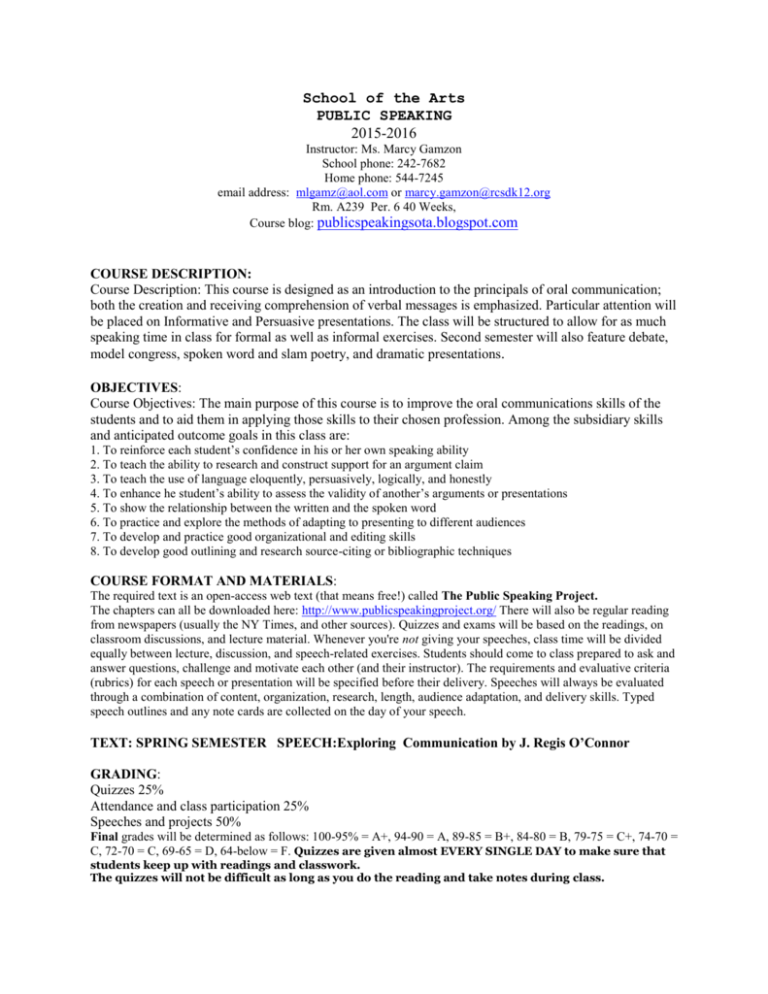
School of the Arts PUBLIC SPEAKING 2015-2016 Instructor: Ms. Marcy Gamzon School phone: 242-7682 Home phone: 544-7245 email address: mlgamz@aol.com or marcy.gamzon@rcsdk12.org Rm. A239 Per. 6 40 Weeks, Course blog: publicspeakingsota.blogspot.com COURSE DESCRIPTION: Course Description: This course is designed as an introduction to the principals of oral communication; both the creation and receiving comprehension of verbal messages is emphasized. Particular attention will be placed on Informative and Persuasive presentations. The class will be structured to allow for as much speaking time in class for formal as well as informal exercises. Second semester will also feature debate, model congress, spoken word and slam poetry, and dramatic presentations. OBJECTIVES: Course Objectives: The main purpose of this course is to improve the oral communications skills of the students and to aid them in applying those skills to their chosen profession. Among the subsidiary skills and anticipated outcome goals in this class are: 1. To reinforce each student’s confidence in his or her own speaking ability 2. To teach the ability to research and construct support for an argument claim 3. To teach the use of language eloquently, persuasively, logically, and honestly 4. To enhance he student’s ability to assess the validity of another’s arguments or presentations 5. To show the relationship between the written and the spoken word 6. To practice and explore the methods of adapting to presenting to different audiences 7. To develop and practice good organizational and editing skills 8. To develop good outlining and research source-citing or bibliographic techniques COURSE FORMAT AND MATERIALS: The required text is an open-access web text (that means free!) called The Public Speaking Project. The chapters can all be downloaded here: http://www.publicspeakingproject.org/ There will also be regular reading from newspapers (usually the NY Times, and other sources). Quizzes and exams will be based on the readings, on classroom discussions, and lecture material. Whenever you're not giving your speeches, class time will be divided equally between lecture, discussion, and speech-related exercises. Students should come to class prepared to ask and answer questions, challenge and motivate each other (and their instructor). The requirements and evaluative criteria (rubrics) for each speech or presentation will be specified before their delivery. Speeches will always be evaluated through a combination of content, organization, research, length, audience adaptation, and delivery skills. Typed speech outlines and any note cards are collected on the day of your speech. TEXT: SPRING SEMESTER SPEECH:Exploring Communication by J. Regis O’Connor GRADING: Quizzes 25% Attendance and class participation 25% Speeches and projects 50% Final grades will be determined as follows: 100-95% = A+, 94-90 = A, 89-85 = B+, 84-80 = B, 79-75 = C+, 74-70 = C, 72-70 = C, 69-65 = D, 64-below = F. Quizzes are given almost EVERY SINGLE DAY to make sure that students keep up with readings and classwork. The quizzes will not be difficult as long as you do the reading and take notes during class. COURSE SCHEDULE FALL SEMESTER 1 SEPTEMBER Course introduction and overview. Speeches of Introduction, Impromptu Speeches Read Speaking Project Ch. 1: Intro to Public Speaking. Speaking Project Ch. 2: Origins of Public Speaking. NY Times reading #1. Read Speaking Project Ch. 4: Listening Effectively. Begin Impromptu speech #1 Finish Impromptu speech #1 Read Speaking Project Ch.8 & 9. Organizing/Outlining & Intros/Conclusions. Read Speaking Project Ch.11 & 12. Speaking with Confidence / Delivery. Read Speaking Project Ch.10. Using Language Well. NY Times reading #2. NARRATIVE SPEECHES (approx. 3-4 minutes in length) Read Speaking Project Ch.15: Informative Speech. Read Speaking Project Ch.16: Persuasive Speech. Brainstorm topic ideas for informative/persuasive speech. NY Times reading #3. Read Speaking Project Ch.3 & 6: Ethics in Public Speaking & Critical Thinking and Reasoning. OCTOBER Read Speaking Project Ch.5: Audience adaptation and questionnaire construction. NY Times reading #4. Rough version of questionnaire brought to class/paired with other students for discussion. Audience analysis day. Students must bring copies of questionnaires to class. Read Speaking Project Ch.7 & 13: Supporting Your Ideas & Visual Aids. NY Times reading #6. INFORMATIVE/PERSUASIVE SPEECHES. (approx. 5-6 minutes in length) PERSUASIVE SPEECHES. (approx. 5-6 minutes in length) NOVEMBER NY Times reading #7. Read Speaking Project Ch.14: Speaking to a Global Audience. Impromptu speech #2 (based on NY Times discussions) DECEMBER/JANUARY OCCASIONAL SPEECHES FINAL SPEECHES (approx. 5-10 minutes) MIDTERM SPRING SEMESTER FEBRUARY Ch. 5 DEBATE AND PARLIAMENTARY PROCEDURE (Model Congress, Mock Trial) MARCH Ch. 6 MASS COMMUNICATION RADIO AND TELEVISION APRIL/MAY Ch. 7 PERFORMING ARTS: ORAL INTERPRETATION (Spoken Word and Poetry Slam) AND DRAMA JUNE (TBD) and FINAL CONTACT: For parents: Please contact me at school, at home, or by email with any questions or concerns you have about your student’s progress. I will try to respond as soon as possible so that we can ensure your student's success in this course. Please register with PARENT/CONNECT for information about your student’s progress and assignments. For students: Questions are good and are encouraged. Feel free to talk to me in class or set up an appointment for a conference regarding your concerns. Involvement and meeting the given requirements are very important for student success in this course. Please sign your name to indicate that you understand the requirements of this course. Failure to comply with the above expectations will result in a meeting between you and me to discuss how to improve the problem area. Please sign below to indicate that you understand the expectations of this course. Please sign, tear off and return. Parent/Guardian Signature: _________________________________________ email:____________________________________________________________ I am/am not registered with PARENT/CONNECT. (Please indicate if you are registered or not) Student Signature : _________________________________________________ Email : ____________________________________________________________ Comments, questions : Classroom Plan Be on time, Be prepared, Be engaged. Early is on time! On time is late! Cell phones and all Electronics are prohibited in ALL classrooms. To include but not limited to: ear buds, headphones, IPODS. The Dress code will be strictly enforced. To include but not limited to: Hats, hoodies and bandanas as well as what is prescribed by the school handbook and posters. Disrespect/Disruption to the educational process is prohibited. To include but not limited to: bullying, profanity, food consumption and personal grooming. POSITIVES: Choice Day Extra Credit CONSEQUENCES: To include but not limited to: Verbal/non-verbal warning/contact log Move the student’s seat Parent contact Lunch detention After school detention Conference with administrator NON-NEGOTIABLES – Immediate removal from classroom To include but not limited to: Fighting; both physical and verbal, vandalism, theft, chronic disruption, and suspicion of being under the influence of illegal substances. SEVERE CONSEQUENCES: To be determined by administration

